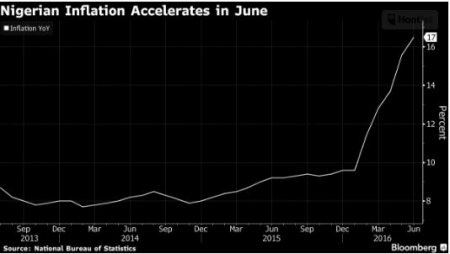P
ProfRem
Guest
National Bureau of Statistics, NBS said Nigeria's annual inflation rose to 16.5 percent in June from 15.6 percent in May.
The highest rate since October 2005, according to data on the CENTRAL BANK OF NIGERIA’s website.
Here are five implications every Nigerian should know...
- More Tough times ahead for Nigerians
- The value of the effect of inflation on savers and investors is that they lose purchasing power. The Nigerian naira will become less valuable with the passage of time.
- Wages and salaries will lag, cost of living increases, making families struggle to keep up as the price of everything from cornflakes to tuition increases faster than the take-home pay they receive from employers.
The 18,000 minimum wage will not be able to cater for certain things as it were before now.
For instance, it takes more Dollars, or Pounds Sterling, or Euros, or Yen, or Swiss Francs, to buy the same quantity of goods.
- Impact on stock markets: The rise in inflation impacts the market sentiments. it helps in driving the interest rates higher and hence borrowing becomes costly both from the market and financial institutions. Therefore, the valuations of capital-intensive companies and sectors come under pressure as their margins decrease due to the higher interest burden.

The International Monetary Fund said this month that Nigeria’s economy could contract for the first time in more than two decades this year as a fall in oil revenue and electricity shortages weigh on output. Gross domestic product contracted by 0.4 percent in the three months through March as the naira peg and restrictions on trading foreign currency led to a shortage of dollars needed to import fuel and materials for manufacturers.
The Central Bank of Nigeria, which kept its benchmark rate at 12 percent in May, will announce its next policy decision on July 26.
The highest rate since October 2005, according to data on the CENTRAL BANK OF NIGERIA’s website.
Here are five implications every Nigerian should know...
- More Tough times ahead for Nigerians
- The value of the effect of inflation on savers and investors is that they lose purchasing power. The Nigerian naira will become less valuable with the passage of time.
- Wages and salaries will lag, cost of living increases, making families struggle to keep up as the price of everything from cornflakes to tuition increases faster than the take-home pay they receive from employers.
The 18,000 minimum wage will not be able to cater for certain things as it were before now.
For instance, it takes more Dollars, or Pounds Sterling, or Euros, or Yen, or Swiss Francs, to buy the same quantity of goods.
- Impact on stock markets: The rise in inflation impacts the market sentiments. it helps in driving the interest rates higher and hence borrowing becomes costly both from the market and financial institutions. Therefore, the valuations of capital-intensive companies and sectors come under pressure as their margins decrease due to the higher interest burden.

The International Monetary Fund said this month that Nigeria’s economy could contract for the first time in more than two decades this year as a fall in oil revenue and electricity shortages weigh on output. Gross domestic product contracted by 0.4 percent in the three months through March as the naira peg and restrictions on trading foreign currency led to a shortage of dollars needed to import fuel and materials for manufacturers.
The Central Bank of Nigeria, which kept its benchmark rate at 12 percent in May, will announce its next policy decision on July 26.

